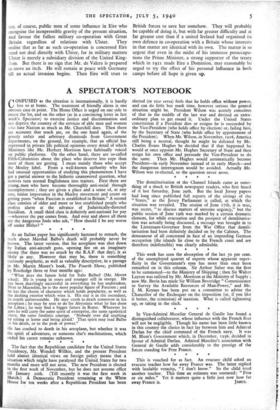The fact that the Republican candidate for the United States
Presidency, Mr. Wendell Willkie, and the present President hold almost identical views on foreign policy means that a situation which might have paralysed the United States for two months and more will not arise. The new President is elected in the first week of November, but he does not assume office till January 20th. (Till recently it was the first week in March.) A Democratic President remaining at the White House for ten weeks after a Republican President has been elected (or vice versa) feels that he holds office without power, and can do little but mark time, however serious the general situation might be. President Wilson was acutely conscious of that in the middle of the last war and devised an extra- ordinary plan to get round it. Under the United States constitution if a President dies or resigns he is succeeded by the Vice-President (who holds office by election) or, failing him, by the Secretary of State (who holds office by appointment of the President). When Mr. Wilson, in November, 1916, America still being a neutral, thought he might be defeated by Mr. Charles Evans Hughes he decided that if that happened he would at once appoint Mr. Hughes Secretary of State and then resign his own office and persuade the Vice-President to do the same. Then Mr. Hughes would automatically become President—in early November instead of in early March—and the dangerous interregnum would be avoided. Actually Mr. Wilson was re-elected, so the question never arose.






























 Previous page
Previous page